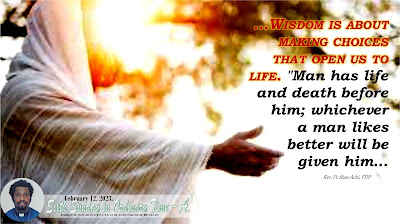MORE RIGHTEOUS THAN THE SELF-RIGHTEOUS.
February 12, 2023.
Sixth Sunday in Ordinary Time – A.
Readings: Sir 15:15-20; Ps 119:1-2, 4-5, 17-18, 33-34; 1 Cor2:6-10; Mt 5:17-37.
“Do not think that I have come to abolish the law or the
prophets. I have come not to abolish but to fulfill.” Mt 5:17
A German proverb says: “Many people preach righteousness and
perform sins.” And a Chinese proverb adds: “If there is righteousness in the
heart, there will be beauty in character. If there is beauty in character,
there will be harmony in the home. If there is harmony in the home, there will
be order in the nation…”
There is a joke saying that no one can pretend to be more
Catholic than the Pope, or more Christian than Christ. Righteousness has a
source and a summit. God is the fount of all holiness, and so the par
excellence source of righteousness. Our vocation, we said last Sunday, is to
become holy as Christ our Lord is holy. And this is a road we daily journey.
In this journey, however, there is a great risk of getting
the wrong model. Righteousness is not a matter of external appearance, but an
inner life in full accord with God's will. It is a life of obedience and
faithfulness. It embraces as well the spiritual and the human. Righteousness
goes beyond mere moral or moralism to become a lifestyle.
We are today on the human aspect of the Lord's teaching on
righteousness, the sermon of the mountain. After giving the Beatitudes as the
Road map or Vademecum of holiness, the Lord, in today's exhortation on the mountain
emphasizes the human dimension of holiness. It is a call to do away with
hypocrisy and appearance. Thus, the Lord says: "For I tell you, if your
virtue goes no deeper than that of the scribes and Pharisees, you will never
get into the kingdom of heaven."
In Jewish society, holiness, faithfulness, and righteousness
are incarnated by the Scribes and the Pharisees. They are the ones people take
as an example when speaking of perfection and purity. They were masters of the
Old Law. As the Ten Commandments were the way to God and Holiness for the Jews,
the Scribes and the Pharisees who were guarantors of these laws were looked at
by people as already perfect. As to say, the guardian is the master of what he
guards. Just as the Pope stands as the first Catholic, the Guardian of
Catholicity. But the fact was that, though supposed to be righteous, the
righteousness of the Scribes and the Pharisees was just one of the surface,
appearance, and so, hypocrisy. The Lord, today warns against that hypocrisy. We
are urged to be righteous than the Self-righteous. It is a call to go beyond
the letter of the Law. Going beyond does not mean to abolish, but to perfect,
to accomplish. "Do not imagine that I have come to abolish the Law or the
Prophets. I have come not to abolish but to complete them."
The Lord gives us here a great lesson of wisdom. Wisdom does
not abolish. Wise people do not make Tabula Rasa of things that were before
them. They rather try to make them better, to bring them to fulfillment.
Just as a parenthesis and comics. A wise politician does not
destroy what others did before him. He makes them better. If you come to a
place or into a position and you behave like the others before you did nothing,
you might be very intelligent and ingenious, but you lack one quality: wisdom.
And because you lack wisdom, you are not smart. For, smart people are wise.
They sit on the old mat to confection the new one. The Lord does not reject the
Mosaic Law, he rather interprets it beyond the letter and in its human and right
way. For, the Law was given for human beings to be perfect. With the presence
of the Messiah, we are urged to go deeper and move beyond the Old Testament
teachings that like the Scribes and the Pharisees we often misrepresented.
In his today's exhortation on the mountain, the Lord teaches
about anger, adultery, and oaths. In every case, Jesus refers to the Law as it
was taught in the Old Testament but then elevates it to an entirely new level.
The main focus in all these is how to reach righteousness while living our
human realities: our temper or emotional life, sexuality, and relationship,
words and promises. The Lord who does not want us to lose the Kingdom of God
gives us the secret to possessing it. It is about controlling our emotions, our
desires, and our words. But to be able to do these, we need a perfect model.
And the Scribes and the Pharisees cannot be that model. As we said last Sunday,
the true and unique model of perfection and holiness is Jesus. To live
following the Beatitudes is to live the life of Jesus and imitate him in all
the ways.
It is only in so doing that we will be called wise. As we can read in the first and second readings, God predestined wisdom to be for our glory before the ages began. God wants us wise and holy. The wisdom in question is not a mere Philosophy, though Philosophy by definition is the love of wisdom (Philos - Sophia). The wisdom of God is not something we should only limit ourselves to love. It is called to be applied to our lives and become part of our being. Wisdom is about making choices that open us to life. "Man has life and death before him; whichever a man likes better will be given him." And God wants us alive, not dead...





Comments
Post a Comment